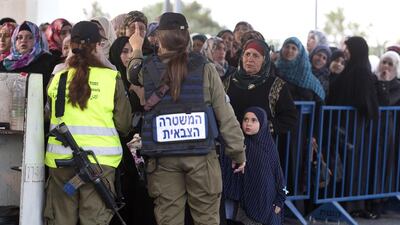JERUSALEM // The far-right Jewish Home party in Benjamin Netanyahu’s ruling coalition has reintroduced a bill designed to weaken Israeli human rights groups that monitor the occupied Palestinian territories.
The bill tabled on Tuesday would strike at the funding of these groups, which depend heavily on foreign support, by levying a 37 per cent tax on those that receive foreign government donations of more than US$50,000 (Dh183,647) a year.
Among the groups that will be affected is Adalah, which combats discriminatory laws and policies against Arabs in Israel and challenges Israeli army practices in the West Bank and Gaza Strip. It receives funding from the European Commission and the governments of Switzerland, Denmark, Sweden and Holland.
“The main motivation of this bill is to stop the working of human rights organisations in Israel,” said Adalah spokesman Majd Kayyal.
The bill, tabled by Jewish Home member Yinon Magal, would also stop government ministries and the army from cooperating with foreign-funded NGOs, and make such groups specify their funding sources in their correspondence.
Based on a failed legislative effort from 2011, the bill was tabled a day after the release of a United Nations report on last summer’s Gaza war that said Israel may have committed war crimes and its political leadership – not just the military – could be culpable.
The report drew on information provided by Adalah and other Israeli rights group including B’tselem, which monitors the occupied territories, and Breaking the Silence, which collects testimonies of soldiers.
The Jewish Home leader Naftali Bennett said the bill could be seen as a response to the report.
Mr Magal has said the bill is needed because foreign governments used such groups to interfere in Israeli prerogatives. Organisations that receive foreign funding are “generally ones that often slander Israel’s reputation”, he said. Im Tirzu, a right-wing organisation that backs the bill, calls Israeli human rights groups “foreign agents”.
Mr Magal is particularly incensed at Breaking the Silence, which collected the testimonies of 60 soldiers from the Gaza war, many of them appearing to show the army’s disregard for the safety of Palestinian civilians. “It says it has testimonies and it presents the Israel Defence Forces as criminal when there is no army in the world that acts so morally towards civilians in a complex situation as the Israeli army,’’ he said.
“These governments can say whatever they want but when they spend all this money to change the policy determined by the democratic choice of Israel’s citizens we have to put a stop to it.”
Yehuda Shaul, the founder of Breaking the Silence, which receives funds from the governments of Norway, Holland, Sweden, Denmark and Switzerland, said it was Mr Magal and the government who are anti-democratic. “It is very sad that our current leadership is trying to do everything possible to limit freedom of speech and the space for civil society to operate,’’ he said.
Mr Kayyal believes Adalah is in the government’s sights because of its cooperation with the UN fact-finding commission on the Gaza war. He defended the group’s actions, saying “it is our right and duty to work with the UN committees and to demand investigation of war crimes in Gaza”.
“We think Israel failed to investigate and closed all the serious files.’’
Liberal legislator Tamar Zandberg said the bill was part of the government’s attempt to cast democracy as a “tyranny of the majority”, without respect for human rights or dissenting minority views. This is also reflected, she said, in the justice minister Ayelet Shaked’s stated intention to limit the power of the supreme court, traditionally seen as the defender of civil liberties, and recent moves by culture minister Miri Regev to cut funding to artists she saw as defaming the state or harming public sensibilities.
"With the encouragement and backing of elements in the government, opposition to the occupation is thought of almost as illegitimate among certain sectors of the public," she told The National.
Prime minister Netanyahu’s position on the bill “is not clear”, according to his spokesman, Mark Regev.
Another organisation that would be severely affected by the bill is Rabbis for Human Rights (RHR), which receives funds from the British government for its legal work in the West Bank, including fighting land takeovers by settlers.
Rabbi Arik Ascherman, director of RHR, noted that the bill singles out government donations, while ignoring the foreign private donations that right-wing politicians and settlers thrive on.
“This is a cheap shot to go after our funding while leaving theirs intact,” he said.
In the view of Sarit Michaeli, spokeswoman for B’tselem, even if Mr Magal’s bill, or a variation of it, does not pass, its effect “is still devastating because the public is told ‘you have to fight enemies from within who are harming our international standing’.
“The government has found a scapegoat, the human rights groups, which are just reflecting reality, not creating it.’’
foreign.desk@thenational.ae

